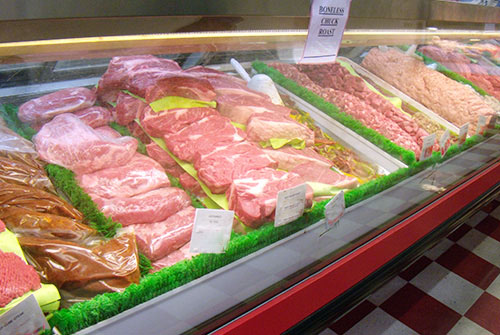Why Buying at a Regional Meat Market Guarantees Fresh, High-Quality Cuts
Shopping at a regional meat market supplies distinctive advantages that usually go undetected by consumers accustomed to larger retail chains. The implications of selecting regional expand beyond instant benefits, motivating a more detailed assessment of what this choice absolutely suggests for both customers and the local economic situation.
Benefits of Regional Sourcing
In the realm of food procurement, the benefits of neighborhood sourcing stick out plainly. By purchasing meat from neighborhood markets, customers get direct access to products that are typically fresher and much more delicious than those found in bigger, business grocery stores. Regional sourcing minimizes the moment and range food takes a trip from ranch to table, which not only improves taste but also protects nutritional value.

Additionally, regional sourcing frequently gives openness pertaining to the origins of the meat. Consumers can ask about the farming techniques made use of, animal well-being requirements, and whether the meat is organic or grass-fed. This details equips customers to make enlightened decisions lined up with their values.
Quality Assurance Criteria
Regional meat markets frequently stick to rigorous quality control criteria that make certain the products used fulfill high safety and freshness criteria. These standards generally incorporate various stages of the meat production procedure, from sourcing to managing and storage.
First, neighborhood markets often develop rigorous provider standards, ensuring that just reliable farms and manufacturers are made use of - bagley meat market edwardsville il. This lowers the possibility of contamination and promotes higher animal welfare requirements. Additionally, numerous neighborhood meat markets execute normal evaluations to verify that the meat is refined under sanitary problems, even more reducing wellness threats
Temperature control is an additional important aspect of quality control. Neighborhood meat markets often keep an eye on refrigeration systems to maintain ideal storage space temperature levels, ensuring that meat stays fresh and safe for consumption. Moreover, the implementation of traceability systems allows markets to track the origin of their products, offering transparency and responsibility.
Last but not least, personnel at local meat markets are frequently educated to identify signs of spoilage and understand appropriate handling methods. This dedication to quality assurance not just elevates the general criterion of the meat but also cultivates consumer depend on, making regional meat markets a trusted resource for high-quality cuts.
Sustaining Local Farmers
Sustaining regional farmers is important for promoting a lasting food system and enhancing community durability. When consumers choose to patronize local meat markets, they directly add to the source of incomes of farmers in their area. This not just supports the local economic climate yet additionally strengthens the farming field, making certain that it continues to be dynamic and practical.


Additionally, supporting neighborhood farmers cultivates a feeling of area and link between producers and customers. It motivates openness in food sourcing and instills trust fund, as customers can develop partnerships with the individuals who elevate their food. This direct connection ultimately results in a much more involved and informed public, which is essential for promoting for lasting farming practices in the future.
Lasting Practices
Sustainable techniques in meat i thought about this markets play an essential role in promoting environmental stewardship and making sure pet welfare. Regional meat markets usually prioritize sourcing their products from ranches that execute lasting and moral farming techniques. These practices include rotational grazing, which aids keep soil wellness and decreases carbon emissions, alongside decreasing the usage of anti-biotics and hormonal agents in livestock.
In addition, local meat markets commonly stress transparency in their supply chains. Customers are given with details relating to the origin of their recommended you read meat, allowing them to make educated options that line up with their worths. By sustaining neighborhood farmers who exercise lasting methods, customers contribute to the preservation of biodiversity and the decrease of transportation discharges related to long-distance meat distribution.
Additionally, numerous neighborhood meat markets participate in waste reduction methods, such as using every part of the animal and advertising off-cuts that could otherwise go unsold. By promoting a much more lasting method to meat intake, these markets not just supply high-grade products but additionally add favorably to the atmosphere and animal welfare. Fundamentally, purchasing at a neighborhood meat market aligns consumers with a more comprehensive movement towards moral and responsible food sourcing.
Customized Customer Support
Shopping at a meat market commonly includes greater than simply the products supplied; it is additionally regarding the experience and the connections constructed between consumers and team. Individualized client service is a hallmark of local meat markets, establishing them besides bigger grocery chains. Well-informed staff put in the time to understand private consumer preferences, guaranteeing that each browse through is tailored to specific demands.
Consumers gain from skilled advice on cuts, food preparation techniques, and preparation ideas, cultivating a feeling of trust fund and loyalty. This individualized interaction allows clients to ask questions and look for recommendations, causing informed buying decisions. Employee commonly bear in mind normal customers and their choices, producing an inviting atmosphere that cultivates area ties.
Additionally, tailored solution includes unique demands, such as customized cuts or particular preparation techniques, which bigger retailers might not fit. This level of attention reinforces the dedication of neighborhood meat markets to top quality and client complete satisfaction.
Basically, personalized customer care not just enhances the buying experience yet additionally makes sure that customers entrust the most effective items matched to their cooking needs, making every see a satisfying one.
Conclusion
Supporting regional farmers cultivates click to read more community relationships and reinforces the local economy, while sustainable methods add to environmental stewardship. Furthermore, individualized client solution boosts the shopping experience, making local meat markets a preferred selection for consumers seeking both quality and honest considerations in their food sourcing.
The ramifications of picking neighborhood expand beyond prompt benefits, triggering a better assessment of what this selection genuinely suggests for both consumers and the neighborhood economic situation.
Sustaining local meat markets additionally contributes to the neighborhood economy. Neighborhood meat markets frequently check refrigeration systems to preserve ideal storage space temperature levels, making sure that meat stays fresh and safe for usage.Regional farmers are often much more attuned to the certain requirements of their areas, expanding crops and elevating livestock that straighten with local tastes and preferences. Supporting local farmers cultivates neighborhood partnerships and enhances the regional economic climate, while lasting methods contribute to ecological stewardship.